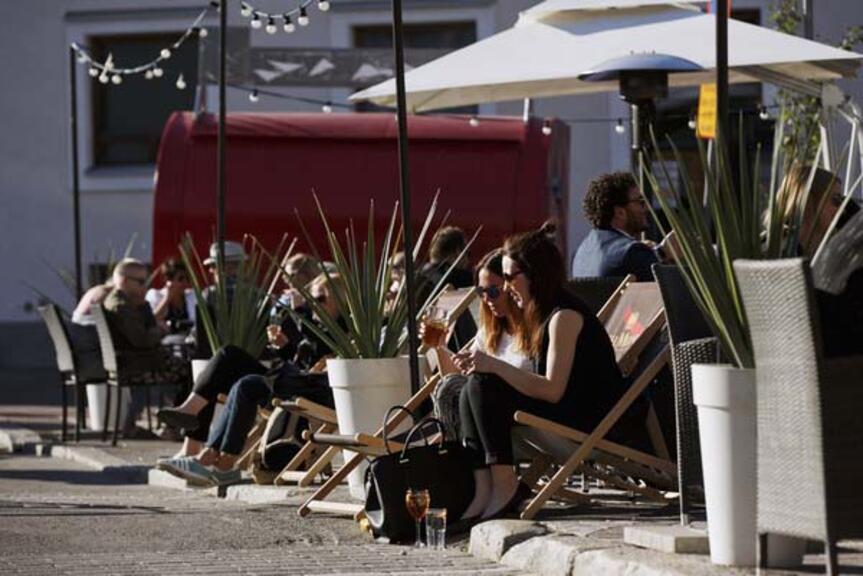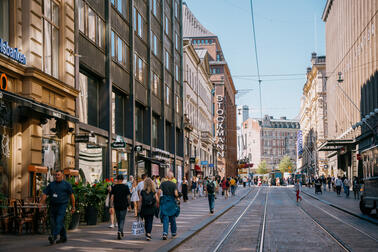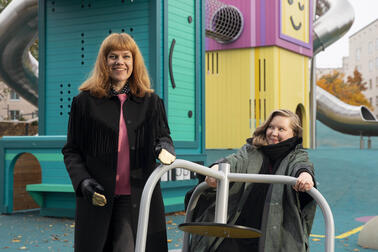
The coronavirus crisis has emptied downtown Helsinki, robbing many businesses there of customers. Now that the government has started to ease coronavirus restrictions, the City of Helsinki aims to support troubled firms by founding a new socially-distanced restaurant and market meet-up area in the city centre.
On 20 May, the city outlined its first round of measures to help restaurant sector businesses regain ground after covid-19 closures. In addition to a proposal to create a new outdoor commercial meeting space in Helsinki’s historic Senate Square this summer, municipal leaders also moved to improve the business prospects of restaurants, bars and cafes by easing permit processes and renewing operating models.
Helsinki hopes its Senate Square idea will be an adrenaline shot for the downtown area, which is crucial for tourism and event planning. The city-owned real estate firm Helsinki Leijona, which manages the development of the historic Tori Quarters adjacent to the square, will be responsible for the practical organization of the venture.
“The vitality of the city centre is critically important for Helsinki as it recovers from this crisis. The travel industry is extremely significant for the city and many of its businesses. Domestic tourism will rise in importance, now that foreign travel is likely to remain shut down for a longer period. We must ensure that Helsinki and the Helsinki city centre continue to be seen as places that provide safe urban experiences – not just for residents of the city, but also for visitors from elsewhere in Finland. We will do everything in our power to promote the revival of urban life in the summer of 2020,” says Mayor of Helsinki Jan Vapaavuori.
Opening the Senate Square to such activity will require careful planning and more details will be announced later. The square is an important cultural and historical landmark, so the new hotspot must be designed to suit the area’s dignified surroundings.
On the nearby waterfront, the city will also develop a pavilion under construction for the postponed Helsinki Biennial and an adjacent pier near the Old Market Hall into a gateway that will welcome leisure maritime services and water transport to the city.
Streamlined permit processing
Helsinki decided earlier this spring to waive rental fees on outdoor restaurant terraces for the months of April and May, and this same exemption has now been extended to June. In addition, the city will streamline its permit process in the restaurant sector and make it easier to build terrace extensions.
If a restaurant wants to create an outdoor seating area in an adjacent park, for example, city officials will decide on the matter according to a new, more lenient operating model for the summer. If the structure in mind is sufficiently light, the city will not require a permit at all for the coming summer.
Restaurant sector activities must comply with the latest guidelines released by the Finnish government on 19 May. These guidelines restrict the number of customers and opening hours in restaurants, bars and cafes. No forthcoming decisions from Helsinki will contradict these guidelines.
Encouraging temporary business endeavours
The City of Helsinki will also promote simple ways to use urban spaces for small-scale business operations. It is in fact already quite easy under current municipal regulations. For example, private individuals can operate pop-up food establishments in outdoor spaces for 12 days a year without notice. It is also possible to sell products in paid parking areas.
Permit processes for small businesses will also be significantly streamlined. The City of Helsinki’s Urban Environment Division’s sub-committee has already permanently delegated temporary permit decision-making power to the permit unit, as of 1 June 2020.
“Helsinki wants to utilize one of its great strengths, its seaside location, and actively offer venues for diverse business activities in our urban environment. Now is the time to be flexible, with the proper regard for safety, of course. It is better to say ’yes’ with conditions than ’no’ with excuses,” says Mikko Aho, Director of the City of Helsinki’s Urban Environment Division.
The city will allow temporary business, sports and cultural activities to take place in popular public areas, such as squares, marketplaces, parks and beaches. Temporary business activities will also be allowed from boats and piers that are not in use by water transport companies.
The City of Helsinki seeks to promote a vibrant urban environment, making sure that each of its versatile districts maintains its cultural and commercial appeal. Municipal efforts to restart activities in the capital will be supported responsibly, with due consideration for the required safety recommendations. Efforts to lesson red tape and streamline operations also comply with the Helsinki City Strategy.


